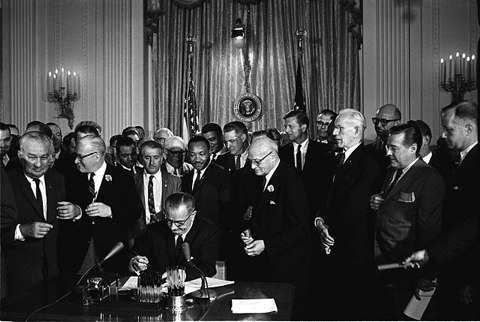The civil rights movement deeply affected American society. Among its most important achievements were two major civil rights laws passed by Congress. These laws ensured constitutional rights for African Americans and other minorities. Although these rights were first guaranteed in the U.S. Constitution immediately after the Civil War, they had never been fully enforced. It was only after years of highly publicized civil rights demonstrations, marches, and violence that American political leaders acted to enforce these rights.
 |
|
President Lyndon Johnson signs the historic Civil Rights Act of 1964. Behind him stands the Reverend Martin Luther King Jr. (Wikimedia Commons) |
President John F. Kennedy proposed the initial civil rights act. Kennedy faced great personal and political conflicts over this legislation. On the one hand, he was sympathetic to African-American citizens whose dramatic protests highlighted the glaring gap between American ideals and American realities. Kennedy understood that black people deserved the full equality they were demanding. He also knew that racial discrimination in the United States, particularly highly public displays of violence and terror against racial minorities, embarrassed America internationally. Moreover, his civil rights legislation generated considerable support among Northern liberals and moderates as well as millions of African-American voters in states where they could vote without difficulty or intimidation.
On the other hand, Kennedy worried about losing the support of white Southern Democrats, still the main political force in that region. He was especially concerned about his re-election prospects in 1964. Facing strong Southern opposition, a reluctant president finally proposed strong civil rights legislation to Congress, admitting privately to civil rights leaders that street protests had forced his hand.
Johnson and the Civil Rights Bill
Kennedy’s assassination on November 22, 1963, changed the political dynamics of the impending civil rights legislation. Vice President Lyndon B. Johnson succeeded Kennedy and almost immediately intensified the campaign for a major civil rights bill. Although a Southern politician, he had developed compassion for the courageous struggles of African Americans during the civil rights movement. His personal commitment to ensuring full equality for minority citizens, in fact, surpassed Kennedy’s.
Johnson stood in a better position than his predecessor to push the civil rights legislation through Congress. An extremely accomplished politician, Johnson thoroughly understood Congress and its complex operations. For many years, he had served as the Senate majority leader. With the responsibility to guide legislation through Congress, he had worked with colleagues of both parties and different outlooks. During his service, he mastered the art of compromise, gaining many victories for his party’s legislative agenda. He also developed close relationships with senators and representatives of both political parties. He regularly used that personal knowledge, combined with charm, flattery, and threats, to achieve his legislative goals. This skill proved especially useful in getting Congress to pass a major civil rights bill.
President Johnson used another key strategy to pass the civil rights bill. He took advantage of the national sympathy and mourning surrounding Kennedy’s tragic death. In public speeches and private talks, he urged passage of the civil rights act as a lasting legacy to the martyred president. Building widespread public support, he urged religious leaders throughout the nation (especially in the South) to use their influence on behalf of the civil rights act.
The actual battle in Congress took all of Johnson’s political skills. Faced with strong opposition from many Republicans and most Southern Democrats, he resorted to his forceful personal powers. He told Georgia Senator Richard Russell, a major opponent of civil rights legislation, that “if you get in the way, I’m going to run you down.” In the Senate, the president faced a filibuster, a delaying debate that could have killed the entire bill. The filibuster lasted 83 days, the longest in Senate history. But Johnson managed to get the votes to end it. He worked the telephones himself and lobbied personally, “twisting arms” of legislators still unsure of how to vote. Enlisting White House aides, civil rights and labor leaders, and key congressional civil rights advocates, he pulled out all the stops to gain a legislative victory.
Johnson’s persistence and political talents succeeded. On July 2, 1964, he formally signed the Civil Rights Act of 1964 into law, using 72 ceremonial pens. Many dignitaries, including Martin Luther King, Rosa Parks, and several other national civil rights figures, attended the ceremony. This law banned racial discrimination in several areas, including hotels, restaurants, education, and other public accommodations. This landmark act also guaranteed equal job opportunities, fulfilling one major objective of the historic 1963 March on Washington. Many larger Southern businesses had already desegregated in response to sit-ins and other civil rights protests. But the Civil Rights Act of 1964 added important legal protections to these political and social developments.
Almost immediately, the new civil rights law came under legal challenge. The owner of an Atlanta motel argued that Congress did not have the authority under the U.S. Constitution to ban segregation in public accommodations. This 216-room establishment, which served an interstate clientele, had long refused to rent rooms to African Americans. When Heart of Atlanta Motel, Inc. v. United States reached the Supreme Court, the court rejected the owner’s argument. It ruled that the commerce clause of the Constitution authorized Congress to enact this type of legislation. Civil rights advocates had achieved their most significant legal victory since the 1954 Brown v. Board of Education decision banning school segregation.
For Discussion and Writing
- What did the Civil Rights Act of 1964 do? Do you think it was effective?
- Why was President Johnson able to pass the Civil Rights Act of 1964? Do you think President Kennedy would have been able to get it passed? Explain.
For Further Reading
Loevy, Robert D. The Civil Rights Act of 1964: The Passage of the Law that Ended Racial Segregation. New York: State University of the New York Press. 1997
Mayer, Robert. The Civil Rights Act of 1964. Michigan: Greenhaven Publishing. 2004.


